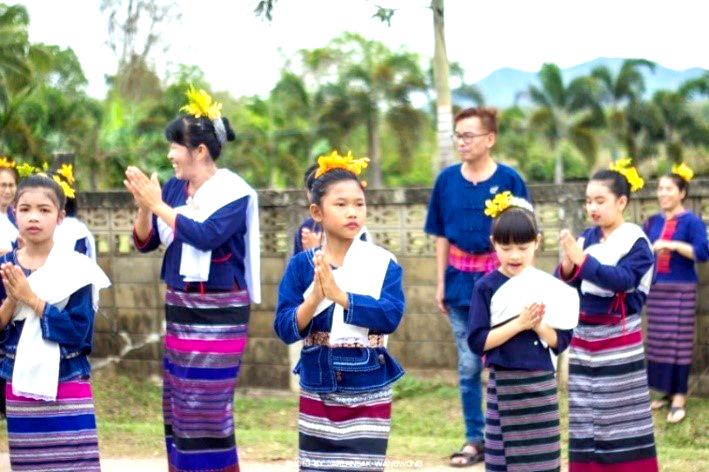Upgrading Kai-Weaved Textiles for Cultural Products of the Mae Loi Luang Community, Chiang Rai Province
Main Article Content
Abstract
The purpose of this participatory action research seeks to upgrade Kai-weaved textiles for cultural products of Mae Loi Luang community, Sri Don Chai subdistrict, Theong district, Chiang Rai province. The research process is based on the implication of the late King’s philosophy entitled “Understanding, Accessibility, and Development”. The research process also employs a survey of local wisdoms on weaved textiles, the development of local products with communities, and evaluation of cultural product appropriateness. Research participants were 15 residents, which included the village head, village committee members, a women’s union director, members of textile-weaving group, and the temple’s abbot. This study revealed that Kai-weaved textiles have been inherited from the Mae Loi Luang community’s local wisdom. The Kai-weaved textile is designed with two thread-stripped weaving techniques in order to create dimensions of Kai-weaved textiles and beauty. The village’s Kai-weaved textiles reflected their ways of life and local identities, which are categorized into two types of cultural products: grandmother-like and niece-like Kai-textile dolls and Kai-stripped. The cultural product quality assessment confirmed a high appropriateness; subsequently, these cultural products raise community awareness of Kai-textile values. In summary, the project facilitated community cooperation in textile-weaving promotion, and the establishment of indigenous textile-weaving center.
Article Details

This work is licensed under a Creative Commons Attribution-NonCommercial-NoDerivatives 4.0 International License.
Area Based Development Research Journal values copyright protection and licensing to safeguard author rights and facilitate the appropriate dissemination of research. Our policies ensure openness, accessibility, and attribution. Authors retain copyright ownership, and articles are published under a Creative Commons Attribution License (CC BY), allowing sharing, adaptation, and proper attribution. Authors have the freedom to publish under the CC BY license, granting broad reuse and distribution permissions. The journal supports posting articles on third-party repositories, adhering to institutional and funding restrictions. Author guidelines detail copyright and licensing requirements, empowering authors with knowledge about their rights and responsibilities. These policies cultivate an environment of collaboration, openness, and responsible sharing, benefiting authors and the research community while honoring intellectual property rights.
References
Burapajattana, J. (2016a). Application of pattern from identity of Mae Chaem fabric for cultural textile product design in home decoration. Veridian E- Journal, Silpakorn University (Humanities, Social Sciences and Arts), 9(3), 1720-1738. (in Thai).
Burapajattana, J. (2016b). Development of souvenir textile products of Ban Had Seao, Sukhothai. Art and Architecture Journal Naresuan University, 7(1), 146-159. (in Thai).
Dechgooltong, P. (2017). Knowledge management on Ban Nasaew local wisdom weaveing, Nasaew district, Chaiyaphum province. Proceeding of 4th Phetchabun Rajabhat University, March 10, 2017, Phetchabun Rajabhat University, Phetchabun. (in Thai).
Juntawong, J. (2015). Commoditization of culture: Chiang Mai walking street. (Master of Arts dissertation), Chiang Mai University. (in Thai).
Office of the National Economic and Social Development Board. (2019). National Economic and Social Development Plan, Version 12. Retrieved October 25, 2019, from https://www.nesdb.go.th/ewt_dl_link.php?nid = 6422. (in Thai).
Pantung, P. (2019a). Participatory development of textile products of Ban Phu Thong community Sukhothai Province. Area Based Development Research Journal, 11(4), 331-345. (in Thai).
Pantung, P. (2019b). The Process to create a pattern of mud mee woven fabric with the participation of Ban Muang Hom woven handicraft group, Phitsanulok province. Area Based Development Research Journal, 11(5), 405-421. (in Thai).
Puangpanya, B., Kenaphoom, S., & Yupas, Y. (2016). Management approach for enhancing the cultural commodity. Bailan Journal, Ubon Ratchathani Rajabhat University, 1(1), 80-101. (in Thai).
Silk Preservation Center. (n.d.). Manual of the silk conservation center. Bangkok: Department of Sericulture. (in Thai).
Singhanate, P., Sangrarang, N., Singharat, W., & Binsodaoh, A. (2016). Development of quality management system for germinated brown rice group with the participation of Ban Lai Hin community, Ko Kha district, Lampang province. Area Based Development Research Journal, 8(4), 53-65. (in Thai).
Singkajorn, S. (2015). Royal initiative of his majesty: Understand, achieve and develop with corporate social responsibility. Electronic Journal of Open and Distance Innovative Learning (e-JODIL), 5(2), 119-129. (in Thai).
Thai Industrial Standards Institute (TISI). (2015). Thai community product standard. Bangkok: Ministry of Industry. (in Thai).


